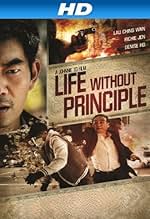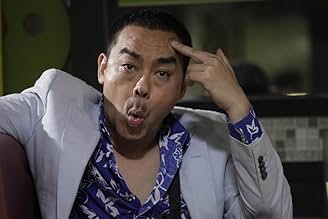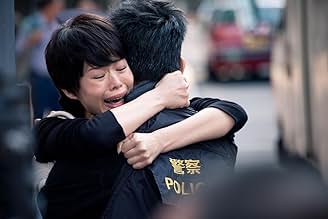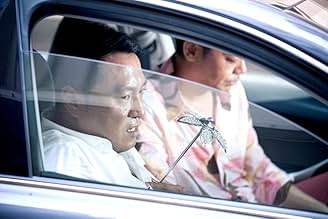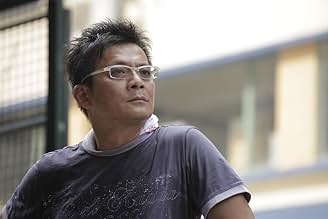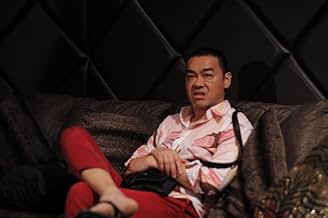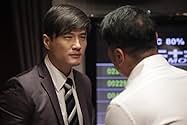VALUTAZIONE IMDb
6,9/10
2908
LA TUA VALUTAZIONE
Aggiungi una trama nella tua linguaThree people - a criminal, a bank officer and a cop - end up in a catastrophic situation in the midst of a global economical crisis and are forced to betray any morals and principles to solv... Leggi tuttoThree people - a criminal, a bank officer and a cop - end up in a catastrophic situation in the midst of a global economical crisis and are forced to betray any morals and principles to solve their financial problems.Three people - a criminal, a bank officer and a cop - end up in a catastrophic situation in the midst of a global economical crisis and are forced to betray any morals and principles to solve their financial problems.
- Premi
- 17 vittorie e 28 candidature totali
Ching-Wan Lau
- Panther
- (as Ching Wan Lau)
Richie Jen
- Inspector Cheung
- (as Richie Ren)
Eddie Cheung
- Wah
- (as Siu-Fai Cheung)
Siu-Kay Lee
- Brother Four
- (as Siu-Kei Lee)
Recensioni in evidenza
I'll start by stating that I'm a big fan of Johnnie To; I love his gangster stuff and his way of telling stories based on ramifications of character decisions, rather than a God of Fate who seems to propel 90% of American films. You could say that it's his trade mark and partly what makes his films so intense and realistic.
Life Without Principle doesn't break this cycle - it has great characters and believable situations, but it just doesn't all come together.
The story told via three separate characters who all intersect thanks to a bag full of money, what mainly drags it down is the scenes being too long. To tries to emphasise on how money and/or greed cause so many problems, and in the process we're dragged through 20 minutes of dull banking set inside one small room before the story switches to focus on the real story.
The next character then runs around town trying to squeeze cash from everybody... again, hitting us with a sense of repetition that will test the patience of many a viewer. Bizarrely, Mr. Sung - the excellent villain we've come to expect from a To film - is introduced right at the end and all I could wonder was, "How different would this film have been had he been in it sooner?"
And that was the problem: too much preaching and not enough entertainment.
Life Without Principle doesn't break this cycle - it has great characters and believable situations, but it just doesn't all come together.
The story told via three separate characters who all intersect thanks to a bag full of money, what mainly drags it down is the scenes being too long. To tries to emphasise on how money and/or greed cause so many problems, and in the process we're dragged through 20 minutes of dull banking set inside one small room before the story switches to focus on the real story.
The next character then runs around town trying to squeeze cash from everybody... again, hitting us with a sense of repetition that will test the patience of many a viewer. Bizarrely, Mr. Sung - the excellent villain we've come to expect from a To film - is introduced right at the end and all I could wonder was, "How different would this film have been had he been in it sooner?"
And that was the problem: too much preaching and not enough entertainment.
Pale color background, 70's and 80's scene set-up, steady frame shot, constant tempo, dramatic directing and acting; the film is full of old day's sentiments, yet it's a story happening in the overwhelmingly prosperous year 2010. Such a misplacement to reflect the most confusing and unbreakable issue that is troubling everyone in the metropolis gives a strong implication of a totally turning upside down era where boundary between right and wrong doesn't exist anymore. Things realigned according to past social order cannot stand the wave of time change; social value, moral standard, principle are all becoming useless and destroyed. No matter how hard one tries to reset it, it's no more than a joke that nobody would pay attention.
As people are turning to a dead end corner, surprises might turn up to help. On the other hand, those who think they can figure out everything not losing a penny might not be as wise as they presume they are, or somehow be ruined by their wisdom. Lo and Keung thought they are the winner of the game; even though they persist until the last breath, their fatal ending wouldn't change. Denise Ho and Lau, playing honest roles ever, should have been the loser of the game, but thanks to an accident, they both live a decent life thereafter without spending an effort. It's not strange or new to see fate or coincidence happening to the characters in Johnny To's film, but being put in a world of misplacement, this time it looks more like an accident than it's under fate, leading to an even more absurd ending where the world is totally unpredictable that one can't reason it. Mankind relies on accident and luck to settle down, that is a laughable grief.
The film, however; doesn't seem to rule out hard work could bring return, at least Wong, the role of recyclable paper collector, has enough significance. Unfortunately just a while later we see an old working class having fallen under the fade-out group of the society trying to kill himself. The script is actually talking to itself debating over the subject. It even further elaborates by condemning through the characters' dialog. The most remarkable one is the confession by JJ Jia in the police station. Her brilliant acting has turned uncontrollably subconscious contradiction within into reasonable greed. What a marvelous demonstration of metropolis ridiculousness!
Sensibility might not win in this battle against absurdity. Richie Ren has been in a terribly confusing state struggling deeply within throughout the entire film. Not to mention the incidents he faces as a police inspector, he has yet to deal with a lot of personal problems such as his wife's persistence to purchase an apartment under the high market price, a seriously sick father and the sudden arrival of a younger sister by the mysterious wife of his father. These, however; are not dramatic enough to constitute irony effect, so the director has to arrange his wife coming to a sudden awakening by seeing him would die as the ending of the story. All these have come together too fast that Richie Ren is unable to react. He acts in such a slow-reflex way that has conveyed his thoughts of questioning "what's going on with my fate?" He rather believes it's all a coincidence. By taking away one's fate, he loses control over his life and all that left to him is coincidence. He has to pray for this for the rest of his life.
Although the script is full of condemns to reality, the director has remained himself as an outsider with a very calm view over what is happening. The shots are all apathetic, just like people ignoring what is happening around them every day. This metaphor is too good, really too good that it might need another accidental coincidence to wake up the audiences before they would even notice it.
As people are turning to a dead end corner, surprises might turn up to help. On the other hand, those who think they can figure out everything not losing a penny might not be as wise as they presume they are, or somehow be ruined by their wisdom. Lo and Keung thought they are the winner of the game; even though they persist until the last breath, their fatal ending wouldn't change. Denise Ho and Lau, playing honest roles ever, should have been the loser of the game, but thanks to an accident, they both live a decent life thereafter without spending an effort. It's not strange or new to see fate or coincidence happening to the characters in Johnny To's film, but being put in a world of misplacement, this time it looks more like an accident than it's under fate, leading to an even more absurd ending where the world is totally unpredictable that one can't reason it. Mankind relies on accident and luck to settle down, that is a laughable grief.
The film, however; doesn't seem to rule out hard work could bring return, at least Wong, the role of recyclable paper collector, has enough significance. Unfortunately just a while later we see an old working class having fallen under the fade-out group of the society trying to kill himself. The script is actually talking to itself debating over the subject. It even further elaborates by condemning through the characters' dialog. The most remarkable one is the confession by JJ Jia in the police station. Her brilliant acting has turned uncontrollably subconscious contradiction within into reasonable greed. What a marvelous demonstration of metropolis ridiculousness!
Sensibility might not win in this battle against absurdity. Richie Ren has been in a terribly confusing state struggling deeply within throughout the entire film. Not to mention the incidents he faces as a police inspector, he has yet to deal with a lot of personal problems such as his wife's persistence to purchase an apartment under the high market price, a seriously sick father and the sudden arrival of a younger sister by the mysterious wife of his father. These, however; are not dramatic enough to constitute irony effect, so the director has to arrange his wife coming to a sudden awakening by seeing him would die as the ending of the story. All these have come together too fast that Richie Ren is unable to react. He acts in such a slow-reflex way that has conveyed his thoughts of questioning "what's going on with my fate?" He rather believes it's all a coincidence. By taking away one's fate, he loses control over his life and all that left to him is coincidence. He has to pray for this for the rest of his life.
Although the script is full of condemns to reality, the director has remained himself as an outsider with a very calm view over what is happening. The shots are all apathetic, just like people ignoring what is happening around them every day. This metaphor is too good, really too good that it might need another accidental coincidence to wake up the audiences before they would even notice it.
Johnnie To, the Godfather of Hong Kong, is the doughtiest and arguably the only Hong Kong film auteur still safeguards the pedigree of the untainted spirit from its halcyon days, after the detrimental ramifications of the censorship battlefield with mainland Chinese policy, which put Hong Kong film industry into a retrograde quagmire, only from Johnnie To's prolific output one (especially for those who has witnessed or influenced by Hong Kong films' golden era, e.g. 1980-1997) can retrieve some salve from the bleak situation (underpins by the poignant slogan "Hong Kong Film is Dead!).
LIFE WITHOUT PRINCIPLE has its clear-sighted objective dispassionateness, adopts 3 discrete narratives from a cop, a bank clerk and a Triad member (with tentative overlays) all converge with a parking lot homicide case, and intriguingly delineates the current situation in Hong Kong society under the background of Greece's ecumenic catastrophe, which reflects the anxiety and levity in normal citizens' mind set. A dowdy retired housewife falls prey to the callous investment chicanery, a vivid mirror image of millions of ourselves, bank system embezzles people's hard-earned savings, benefits from the (almost inclusive) profit while shunts all the risky liabilities to each account holder, a deep-rooted capitalism scourge on the modern society. Veteran actress Hang Shuen So conducts a visceral impersonation using her meager appearance as the cipher victim. Denise Ho (an out-of-the-closet lesbian singer and new actress) garnishes the office-confined monotony with her restrained tolerance and discontentment as the conscientious clerk, a subdued archetypal in the white-collar hierarchy.
Versatile actor Ching Wan Lau is the Triad minion, pious to his boss and brothers, although time changes, the Triad business are at the low ebb now, but his foolhardiness resists with a perverse tenderness, in a time when brotherhood can be easily teased as homo-erotic metonymy, his loyalty is far-fetched but resonates with the gangster nostalgia which permeates the genre's best moments (To's ELECTION 2005, 8/10 and TRIAD ELECTION 2006, 8/10 are among the swan songs), Ching Wan Lau experiments a methodological mimicry with blinking-laden vivacity in his character's naive and befuddled persistence.
The third thread germinates from Richie Ran's cop, which ruefully is the weakest link and casts a shadow to the development of the character's below-the-surface tension, the elevator incident with explosive serves the only chilly thrill of the film which feels insatiable for To's generic followers.
The ending mercifully caters for a interim reprieve to the 3 protagonists, but To seems to be as unconvincing as the audiences, the fluke (gamble) is not an elixir, the stopgap is rickety, everyone is still caught in the spiderweb and the exit sign seems too far to reach.
LIFE WITHOUT PRINCIPLE has its clear-sighted objective dispassionateness, adopts 3 discrete narratives from a cop, a bank clerk and a Triad member (with tentative overlays) all converge with a parking lot homicide case, and intriguingly delineates the current situation in Hong Kong society under the background of Greece's ecumenic catastrophe, which reflects the anxiety and levity in normal citizens' mind set. A dowdy retired housewife falls prey to the callous investment chicanery, a vivid mirror image of millions of ourselves, bank system embezzles people's hard-earned savings, benefits from the (almost inclusive) profit while shunts all the risky liabilities to each account holder, a deep-rooted capitalism scourge on the modern society. Veteran actress Hang Shuen So conducts a visceral impersonation using her meager appearance as the cipher victim. Denise Ho (an out-of-the-closet lesbian singer and new actress) garnishes the office-confined monotony with her restrained tolerance and discontentment as the conscientious clerk, a subdued archetypal in the white-collar hierarchy.
Versatile actor Ching Wan Lau is the Triad minion, pious to his boss and brothers, although time changes, the Triad business are at the low ebb now, but his foolhardiness resists with a perverse tenderness, in a time when brotherhood can be easily teased as homo-erotic metonymy, his loyalty is far-fetched but resonates with the gangster nostalgia which permeates the genre's best moments (To's ELECTION 2005, 8/10 and TRIAD ELECTION 2006, 8/10 are among the swan songs), Ching Wan Lau experiments a methodological mimicry with blinking-laden vivacity in his character's naive and befuddled persistence.
The third thread germinates from Richie Ran's cop, which ruefully is the weakest link and casts a shadow to the development of the character's below-the-surface tension, the elevator incident with explosive serves the only chilly thrill of the film which feels insatiable for To's generic followers.
The ending mercifully caters for a interim reprieve to the 3 protagonists, but To seems to be as unconvincing as the audiences, the fluke (gamble) is not an elixir, the stopgap is rickety, everyone is still caught in the spiderweb and the exit sign seems too far to reach.
This is certainly a departure from Johnnie To's usual work, but nonetheless, it is a film that is easy to like and relate. With the Greek financial crisis as the backdrop for a story about greed, human nature and life. It is one of those films that does not feel like a complete episode, but rather the sums of its parts. What I like about To's film is that they are so efficient and there is also recurring themes in all his films – life is about taking chances, random events of luck, expect the unexpected and the human nature of greed. His ability to present simple stories into a smooth cinematic experience is simply wonderful to endure. Although the film breaks no new grounds on the topic of greed in the financial market and especially Hong Kong people, it is still a worthy addition to 2011's HK cinema. Perhaps two words that best describe this film would be - simple and efficient. After all, as Mr. Geeko used to say - "Greed is good"...
Neo rates it 7.5/10
Neo rates it 7.5/10
- www.thehkneo.com
The long-gestating Johnnie To movie 'Life Without Principle' chooses as its theme the interminable greed of mankind, set against the backdrop of the current financial crisis. Taking almost three years for the auteur to get it off the page onto the screen, it is also his most narratively complex film since 'Election', intertwining the stories of a bank employee, a cop and two triad gangsters over the course of one fateful day when the Greek economy essentially goes 'kaput'.
Unfolding quite independently of each other at first, To requests the patience of his audience as he slowly builds up each narrative thread to flesh out the key characters. First in line is bank employee Teresa (Denise Ho), who is under pressure from the team manager to meet her sales targets for a new complex financial product before the New Year. She makes cold calls from a list of bank customers, the derision she faces enough to make one think twice about being mean to the person on the other end of the line in similar real-life situations.
The focus of this segment is Teresa's persuasion of an elderly woman (So Hang-Shuen) to invest her life savings into a high-risk fund, despite the mismatch between the investment product and the client's risk appetite. The client laments about the bank's low interest rates on deposits, and Teresa sees an opportunity to be less than scrupulous- despite her nagging conscience. This is certainly a parallel between this and our very own DBS 'High Notes 5' saga not too long ago- and To mines the realities of this sequence to highlight the pitfalls many ordinary citizens often fall into when making poorly informed investment decisions.
To also uses this segment to introduce two supporting characters- the balding loan shark Yuen (Lo Hoi-Pang) who gets robbed immediately after withdrawing five million from the bank; and the soon-to-be-married Connie (Myolie Wu) frustrated at her fiancée's reluctance at buying an apartment for investment. Yuen will figure later in the second story thread led by triad runner Panther (Lau Ching Wan) and his buddy Lung (Philip Keung), who runs an illegal business operation dabbling in Internet stock trading.
Thanks to Lau's fine turn playing the exceedingly righteous Panther with just the right balance of levity and gravity, this is easily the most colourfully entertaining segment- and because of the gangster milieu also the one which To's fans will find most familiar. Using the first half to emphasise Panther's servility as he tries to post bail for a fellow triad honcho (Eddie Cheung), To's investment in character development pays off in understanding Panther's loyalty to Lung and the extent he is willing to go to help Lung out of his financial doldrums.
The third, and perhaps least developed, story concerns Inspector Cheung (Ritchie Jen), whose dedication to his work is another reason for his fiancé Connie's frustration. Though Cheung is seen earlier crossing paths with Panther, it is Cheung's heroism saving another elderly man from committing suicide and his subsequent change in perspective that this segment is concerned with- though there Is a severely undercooked subplot involving Cheung's father's death from cancer and the fate of his young half-sister. This and the other two seemingly disparate plot threads only coalesce towards the last half hour of the film- but rest assured that To rewards your patience with a riveting conclusion that connects the various characters brilliantly, albeit with some degree of deus ex machina especially towards the end.
But beyond the plotting, To's film is also extremely meaningful as a reflection of the interconnectedness of our livelihoods with the ups and downs of the world economy. Bearing great thematic relevance and prescience, the movie paints a stark picture of how the very wellbeing of ordinary and disparate folk can be affected so drastically by something happening on a different continent. It is also not afraid to expose the flaws within the growing complexities of our financial industries, which entraps the sweat-soaked dollars and cents of good hardworking people.
If the above discourse on the film's themes isn't yet clear enough, then let us also state categorically that those looking for To's trademark shoot-em-up actioners will likely be disappointed. There is nary a shootout in sight, nor a bullet fired for that matter, but To's gamble to attempt a multi-strand narrative built around pertinent social issues (think 'Traffic', 'Crash' or even this autumn's 'Contagion') pays off handsomely- thanks also to solid acting from To's usual band of regulars and some expert editing from David Richardson. As the fruit of To's labour for the past three years, it also reaffirms his position as one of the best, if not the best, directors in Hong Kong today.
Unfolding quite independently of each other at first, To requests the patience of his audience as he slowly builds up each narrative thread to flesh out the key characters. First in line is bank employee Teresa (Denise Ho), who is under pressure from the team manager to meet her sales targets for a new complex financial product before the New Year. She makes cold calls from a list of bank customers, the derision she faces enough to make one think twice about being mean to the person on the other end of the line in similar real-life situations.
The focus of this segment is Teresa's persuasion of an elderly woman (So Hang-Shuen) to invest her life savings into a high-risk fund, despite the mismatch between the investment product and the client's risk appetite. The client laments about the bank's low interest rates on deposits, and Teresa sees an opportunity to be less than scrupulous- despite her nagging conscience. This is certainly a parallel between this and our very own DBS 'High Notes 5' saga not too long ago- and To mines the realities of this sequence to highlight the pitfalls many ordinary citizens often fall into when making poorly informed investment decisions.
To also uses this segment to introduce two supporting characters- the balding loan shark Yuen (Lo Hoi-Pang) who gets robbed immediately after withdrawing five million from the bank; and the soon-to-be-married Connie (Myolie Wu) frustrated at her fiancée's reluctance at buying an apartment for investment. Yuen will figure later in the second story thread led by triad runner Panther (Lau Ching Wan) and his buddy Lung (Philip Keung), who runs an illegal business operation dabbling in Internet stock trading.
Thanks to Lau's fine turn playing the exceedingly righteous Panther with just the right balance of levity and gravity, this is easily the most colourfully entertaining segment- and because of the gangster milieu also the one which To's fans will find most familiar. Using the first half to emphasise Panther's servility as he tries to post bail for a fellow triad honcho (Eddie Cheung), To's investment in character development pays off in understanding Panther's loyalty to Lung and the extent he is willing to go to help Lung out of his financial doldrums.
The third, and perhaps least developed, story concerns Inspector Cheung (Ritchie Jen), whose dedication to his work is another reason for his fiancé Connie's frustration. Though Cheung is seen earlier crossing paths with Panther, it is Cheung's heroism saving another elderly man from committing suicide and his subsequent change in perspective that this segment is concerned with- though there Is a severely undercooked subplot involving Cheung's father's death from cancer and the fate of his young half-sister. This and the other two seemingly disparate plot threads only coalesce towards the last half hour of the film- but rest assured that To rewards your patience with a riveting conclusion that connects the various characters brilliantly, albeit with some degree of deus ex machina especially towards the end.
But beyond the plotting, To's film is also extremely meaningful as a reflection of the interconnectedness of our livelihoods with the ups and downs of the world economy. Bearing great thematic relevance and prescience, the movie paints a stark picture of how the very wellbeing of ordinary and disparate folk can be affected so drastically by something happening on a different continent. It is also not afraid to expose the flaws within the growing complexities of our financial industries, which entraps the sweat-soaked dollars and cents of good hardworking people.
If the above discourse on the film's themes isn't yet clear enough, then let us also state categorically that those looking for To's trademark shoot-em-up actioners will likely be disappointed. There is nary a shootout in sight, nor a bullet fired for that matter, but To's gamble to attempt a multi-strand narrative built around pertinent social issues (think 'Traffic', 'Crash' or even this autumn's 'Contagion') pays off handsomely- thanks also to solid acting from To's usual band of regulars and some expert editing from David Richardson. As the fruit of To's labour for the past three years, it also reaffirms his position as one of the best, if not the best, directors in Hong Kong today.
- www.moviexclusive.com
Lo sapevi?
- QuizDebuted at the second spot of the Hong Kong box office and held the position in its second week.
- ConnessioniReferenced in Mo ngai: To Kei Fung dik din ying sai gaai (2013)
I più visti
Accedi per valutare e creare un elenco di titoli salvati per ottenere consigli personalizzati
- How long is Life Without Principle?Powered by Alexa
Dettagli
- Data di uscita
- Paese di origine
- Siti ufficiali
- Lingua
- Celebre anche come
- Life Without Principle
- Aziende produttrici
- Vedi altri crediti dell’azienda su IMDbPro
Botteghino
- Lordo in tutto il mondo
- 1.203.873 USD
- Tempo di esecuzione
- 1h 47min(107 min)
- Colore
- Mix di suoni
- Proporzioni
- 2.35 : 1
Contribuisci a questa pagina
Suggerisci una modifica o aggiungi i contenuti mancanti


